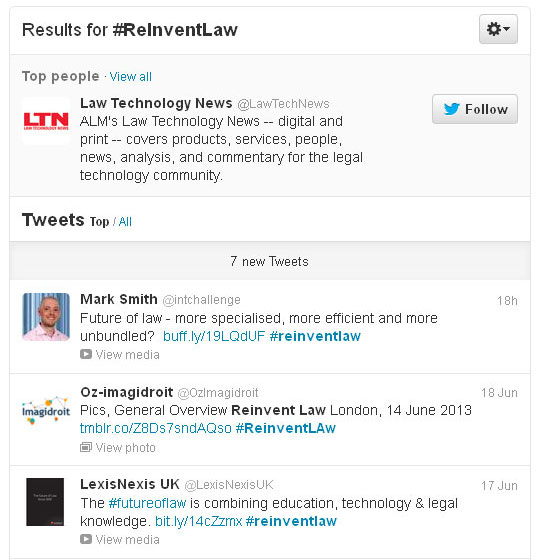Reporting on Change
ReInvent Law London
My colleague Rob Jones delivered a six minute talk at Re-invent Law London, a novel crowd-sourced conference which took place in London on Friday 14 June. His presentation “Wax Up, Not Wipe Out!” was about seismic changes taking place in the legal profession. According to Rob, “Change brought by technology is a wave and lawyers are like surfers out in the open waters. ‘Wiping Out’ (to fail) is an ever present risk that can lead to embarrassment or worse. It is better to ‘wax up’ the board and tackle the waves with enthusiasm and a little intelligence, to make sure that you stay on top of them”. Rob’s talk was videoed and we will post a link to it soon. For now suffice it to say that he looked into the crystal ball at a world driven by technology where justice will perhaps be obtained from the cloud through an app available on your tablet. He also looked at the tsunami of information surrounding us and how to extract meaning from it in legal disputes using new technologies like Technology Assisted Review. Recognising that justice comes at a cost and the legal system is creaking and groaning under its own weight, Rob spoke about smart computers rescuing the situation by allowing leanness, efficiency and case winning power to enter the legal process. Referring to our experience using TAR on over 250 projects, Rob said that the computer is already looking over the shoulders of humans to build intelligence and suggested that it may not be long before similar algorithms are used to create a legal super brain that can predict outcomes, forecast fees and aid strategic decision making which could turn human lawyers into formidable competitors and opponents.
If you would like to read more about the event you can use the following hashtag on Twitter #ReInventLaw.
We found it to be a very refreshing conference with stimulating content and very high calibre of speakers on law and technology disciplines.
The Not So New Rules of Court
In the two months since the changes to the rules of court governing disclosure and cost management in litigation there have been no reported cases and very few anecdotal reports about how the new rules are affecting cases. At this stage it seems that there are still more questions than answers about how cost management, proportionality and tailor-made disclosure will play out in practice. We have been tracking the changes closely and have hosted two seminars on the impact of the new rules for the legal community in London and Manchester. These enlightening panel discussions have involved members of the judiciary, experts from legal practice, and providers of disclosure-related services. We have prepared a detailed note The Jackson Reforms on Disclosure and Costs Management: FAQ, on some of the key questions lawyers are asking about the new rules along with insights we have gained about them.
As Mark Surguy, a partner at Eversheds and a respected voice on edisclosure recently pointed out, the weighing up of options, solutions and costs is a best practice approach to any dispute. With that approach in mind, the new reforms should not present any client, lawyer or technology service provider with any difficulty. Judge Waksman echoed this sentiment when he said in Manchester that there is no need for litigators to be afraid of the changes. By far the best tactic according to Mark will be to get to the heart of a case quickly, using technology so that the client can understand the prospects of success and make the right decisions about settlement or further investment in the litigation.
On a Company Note
On the topic of change, we have seen some ourselves recently at Kroll Ontrack. Tim Phillips, has been appointed as the new Managing Director for our Legal Technologies business. Tim has been with us at Kroll Ontrack since 2007, serving as Sales Director for the European Region. As MD, he will have responsibility for operations and business development throughout EMEA, reporting to Dean Hager, president and CEO of Kroll Ontrack. Tim says, “I’m delighted to take on this new role. In the EMEA region, we are focused on steady growth and development geographically and in terms of new products and services to specifically address data privacy requirements. Our vision is to leverage the extensive European footprint we have through our existing facilities to provide a full suite of electronic evidence handling software and services to our clients across the region. Our focus in EMEA integrates well with Kroll Ontrack’s broader strategy to help companies manage edisclosure strategically by making it a repeatable process that is managed at a portfolio level, not just at the one-off project level.”

